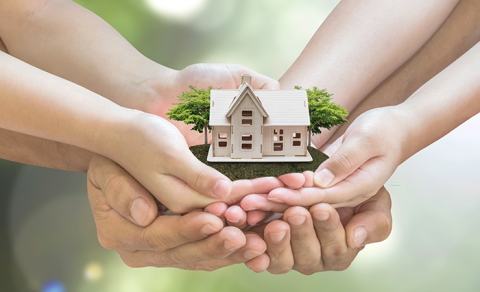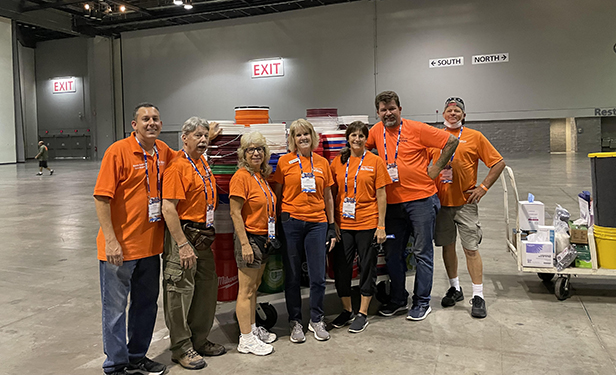Orange County Convention Center Helps Design & Construction Week Make Impactful Donations to Support Affordable Housing

There is no doubt that when a trade show goes the extra mile to make a positive difference in its host community, the impacts can be incredibly meaningful. Case in point: the 9th annual Design & Construction Week (DCW), held at the Orange County Convention Center Feb. 8-10, which generously donated $13,300 in leftover kitchen, bathroom, living room and outdoor items to an Orlando-area nonprofit with support from the venue’s sustainability coordinator.
As the largest in-person trade show to take place at the facility since the onset of the pandemic, the massive event consisted of two collocated trade shows: the NAHB International Builder’s Show (IBS), the world’s largest annual residential construction expo, and the Kitchen & Bath Industry Show (KBIS), North America’s largest show for the kitchen and bath industry.
Via a collaboration Katerina Chagoya, the OCCC’s sustainability coordinator, show organizers were able to connect with West Orange Habitat for Humanity to ensure that the gently used furniture, household goods and building materials displayed by DCW exhibitors were sent to the organization’s ReStore in Winter Garden, where they would be sold to help support the Habitat’s mission of creating decent and affordable housing.
“All of the sales from our ReStore go directly towards helping to build safe, decent, affordable homes for local families in need,” said Nicole Campbell, communications manager for West Orange Habitat for Humanity. “These donations are a huge part of our operation as a non-profit and allow us to further our mission here in Central Florida.”
For nonprofit organizations like West Orange Habitat, trade shows and conventions can be a reliable source of donations. According to OCCC officials, shows held at the convention center this year have so far provided nearly $250,000 worth of donations to the organization. But to make that kind of massive-scale giving a reality, teamwork and coordination on the part of show organizers and the venue are essential parts of the equation.

In her role at the OCCC, Chagoya works with each client to coordinate donations with local non-profits, schools and charitable organizations in Orange County and Central Florida. During the donation process, she assists clients by providing an ever-growing resource list of local partners, from which point the client directly handles coordination of the donations. More frequently, the event will choose to leave the donations entirely in the hands of the OCCC and Chagoya herself.
“As a publicly owned and operated government facility, the OCCC provides information on which nonprofits can receive goods, however, the client makes the ultimate decision and occasionally a priority list of which organizations should receive the donation,” Chagoya explained. “If the event has no preference, the OCCC sends the items throughout Central Florida. In this case, the West Orange Habitat for Humanity ReStore staff and volunteers, as well as OCCC staff, coordinated the storage and transport of donations.”
To help facilitate the process for event clients interested in donating post-show, Chagoya will compile a complete inventory of items that won’t be returning with the client or the vendors in each exhibit booth. She then takes photos of the items, documents the items, quantities, dimensions and locations on the floor, and sends this information to a variety of organizations that can then claim the items on a first-come, first-serve basis. Once the organizations have claimed the items, Chagoya assists with coordinating their transportation and provides a report of weight, approximate value and which organization has received each item.
So how can more trade shows jump on board with post-show donation efforts? It all starts with pre-show planning and coordination, Chagoya said.
For example, think about what items will be left behind after the event, from large fixtures and furniture all the way to small items like lanyards and fake plants, then ask the convention center if they have a donation process, she suggested. Additionally, ask them to assist with providing names of local non-profits, schools and charities, keeping in mind what types of items these entities accept, if they have transportation and if someone is available to unload large items, she added.
Many convention centers, like the OCCC, now offer customized green meeting services for clients, which should include a network of charities and partners to help facilitate post-show donations.
Don’t miss any event-related news: Sign up for our weekly e-newsletter HERE and engage with us on Twitter, Facebook, LinkedIn and Instagram!


Add new comment